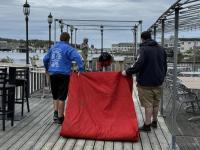Historic lighthouse lens to remain in Maine
Last week a significant piece of Maine’s maritime history was destined for a warehouse in Boston filled with other “Property of the U.S. Government” items.
But now, thanks to an 11th hour rescue by Maine Maritime Museum, the 1,800-pound Fresnel lens, installed in 1874 and which helped guide mariners safely into Casco Bay from atop the east tower of Two Lights on Cape Elizabeth for more than 120 years, will stay in Maine.
The new home for the lens will be at the museum in Bath.
“This lens is a significant cultural artifact with great meaning for the community of Cape Elizabeth,” said Amy Lent, the museum’s executive director. “I am happy that we learned of the impending move in time to step in and keep it in Maine.Coincidentally, the museum’s current exhibit is about the U.S. Coast Guard in Maine, past and present, including the Lighthouse Service.”
“It will take time to arrange proper long-term exhibit space and to create an interpretation that will bring this lens to life again,” Lent said. “We hope to collaborate with the community to ensure this part of Maine’s heritage is accessible to all visitors who have a fondness for lighthouses in general and the Cape Elizabeth Light in particular.”
Although the Cape Elizabeth Light was automated in 1963, eliminating the need for a lighthouse keeper, the lens remained and continued its operation until it was replaced by state-of-the-art equipment in 1994.
It was then displayed at the Portland Coast Guard Station. In 1995, the Coast Guard agreed to loan it to the town of Cape Elizabeth for 10 years as part of the Portland Head Light collection.
The lens became a familiar sight to those coming to the Cape Elizabeth Town Hall where it was displayed. The town council paid the more than $2,500 annual insurance premium to cover the lens, which had been valued at $2.5 million. This year the situation changed.
The Cape Elizabeth Town Council recently approved funding for the renovation of the town hall, necessitating relocation of the lens. When the Coast Guard was contacted about moving the lens, the town learned that the loan could be renewed but that the conditions of such loans had changed. A “qualified lampist” would have to dismantle and reassemble the lens to move it; the frame would have to be re-glazed; and the lens would have to be protected from ultraviolet light and visitors’ touches in its new location.
Town Manager Michael McGovern summarized the situation in an email to the Town Council. “Updated conditions and insurance could result in an annual cost of about $7,500 to care for this lens,” he wrote. “I recommend we return this lens to the Coast Guard to ensure its long term preservation.”
On April 11 the Cape Elizabeth Town Council did just that, it voted to return the lens to the Coast Guard.
Based on the 1995 agreement, the town is still responsible for the dis-assembly, crating and shipment of the lens back to the Coast Guard.
An estimate by a qualified lampist for disassembling and crating came in at just under $8,500. Insurance and transport would be additional. The contract was signed, and it appeared the lens for the historic Cape Elizabeth Light was headed to Boston and its place on a warehouse shelf.
Then last week Arlyn Danielson, curator for the Coast Guard, who had recently helped support Maine Maritime Museum in putting together its Coast Guard exhibit, decided to call the Museum to see if the lens might find a new home there.
“We were very interested,” said Nathan Lipfert, the Museum’s senior curator. “Maine has more lighthouses than any other coastal state. Pieces of these lights, like the Cape Elizabeth lens, are important technological artifacts, which are difficult and expense to preserve. They are crucial to helping us understand the technology and economics of maritime trade in earlier centuries. They have become cultural artifacts as well, and many people are interested in them.
“The Cape Elizabeth Light lens will become the largest lighthouse artifact in our collection, and we look forward to having it in our care,” he added.
Event Date
Address
United States





















